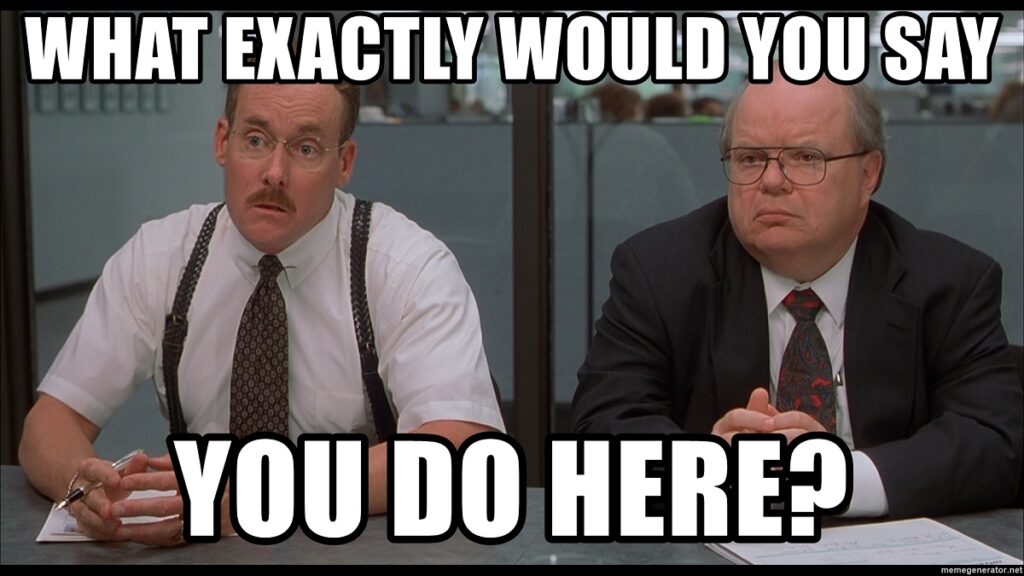What would you say you do here?
A lot of students ask “what can I do with a marketing degree” and it is actually a pretty difficult question given the broad scope of marketing. Marketing is a fun discipline where there is so much multidisciplinary depth that allows for a wide variety of careers that pinning down this answer is nearly impossible. So, with that, I want to note a few things on what to think about when trying to answer this question.

Marketing Definitions
It seems only fitting that there should be a starting point for the presentation of materials (which we will call operationalization). The cleanest definition of marketing is probably from the American Marketing Association that is “Marketing is the activity, set of institutions, and processes for creating, communicating, delivering, and exchanging offerings that have value for customers, clients, partners, and society at large.” There is a lot to unpack there, but the main things that we can focus on to make the point is the idea of “exchange” and “value”.
Marketing is Exchange
The place where marketing lives is at the point of exchange. When two things are brought together to make the exchange, marketing is the facilitator, no matter if this is a bushel of wheat in exchange for an amount of eggs or if it is cash for a private jet. All exchanges are marketing’s function, even if money has changed over time. You might be saying, “that doesn’t sound right”, so I will dive further. Management is in place to run an effective organization that can help facilitate the exchange. Finance and economics can help with setting the price and understanding the structure needed to have a financially healthy company. Accounting can help keep track of the costs and help with productivity of the monies within the company. So other disciplines have a hand in helping, but the point of exchange is still marketing.
If you are going to buy a basket of goods, but the lines are too long and you abandon your cart, that is a marketing failure. When a great product isn’t purchased by people because they didn’t know about it, that is a marketing failure. Customers entering a store where they products they want are not there, when the price is too high, when the wrong people are receiving the advertising… The list can go on and on. But lets say that all these things are correct and that the right product is at the right place at the right time for the right people at the right price. Marketing has done it’s job at this point and that is usually when no one notices.
Marketing Determines Value
Overarchingly, value is the benefits received minus the costs. This doesn’t necessarily mean that the costs are all financial. Costs can be time, functions, efficiency, etc. In a similar vein, benefits should be looked at through the eyes of the purchaser, so my benefit may be different compared to your benefits depending on what I hold as valuable. I am someone who finds automobiles troublesome and wish they weren’t a necessary part of life. Others may find that this is their true passion and calling, so the value they receive from buying a car is markedly different from me. Value is found when that simple equation is positive and the person seeking the value can be be pleased with the exchange.
Marketing Functions
With some definitions out of the way, there is also some utility in being able to say what the components of marketing entail from the side of studying the concept. In broad strokes, we can put topics learned in a marketing degree on a continuum with one side being Consumer Behavior (CB) and the other being Marketing Strategy (Strategy). On the CB side, this is where a lot of psychology principles come in to identify individual’s and their behaviors to better serve them. On the strategy side, we can think of this as where finance, management, accounting, etc. all focus on the firm as a whole to focus on the long-term of the firm. These are very broad strokes, so this is only to provide illustration. As you can probably tell by now, these functions are pretty much all-encompassing with regard to the functions of business. One side is the micro-level to it’s smallest degree and one is the macro-level of everything. Many of the things that people know marketing for are along this continuum including sales, advertising, digital marketing, retail, etc.
Job skills for Marketers
So, now that we have some definitions, what can one do with a marketing degree? As mentioned before, some of the most common answers are going to be advertising, sales, and “social media”. All of those are valid, but some of the more recent answers include things like big data, digital marketing (social media falls under this heading), and direct marketing. All of these are reworks of other, prior types of marketing, but marketing is always at the bleeding-edge of technology so that we can continue to be effective in our roles. Depending on the job title and function, marketing can be found in most all jobs in one way or another.
Something else worth noting, which is somewhat a bias it could be argued that I have, is that small business owners are inherently marketers at the base level. The multidisciplinary nature of marketing allows a small business owner to need to understand how the business is financed, how to get customers in the door, how to be productive, and everything else in between. By being multidisciplinary, it allows for a nimble business owner who can know how to do an objective, or at least have a strong knowledge to be able to know enough to have informed discussions and make informed decisions. While this is very far from an exhaustive list, it is at least a start to understand what is it that I could do if I were to pursue a degree in the marketing discipline.


